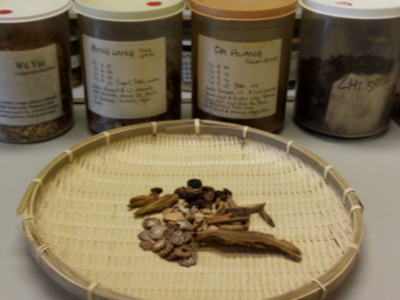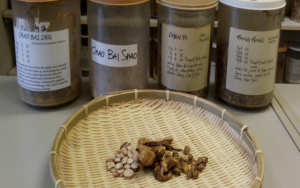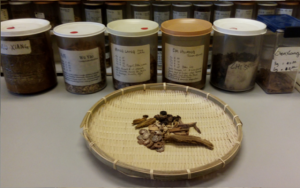
October 30, 2023
Nurturing Harmony: Embracing Chinese Medicine in working with Anxiety

Dr Giles Sadler has written about the connections between our digestive health and our mental and emotional health, and the best herbal formulas to help you feel better. Enjoy the read below:
It seems to be common sense that our happiness affects our health, particularly our digestion. And language has many examples of comparing mental and emotional states with our alimentary tract. A shock can “hit us in the guts”, considered thinking is “chewing things over” or “ruminating”, we have “gut feelings”, and Australians say that things or people “give them the shits”. Whilst Chinese Medicine practitioners may see this link, conventional medicine’s empirical paradigm doesn’t allow the recognition of phemomena that it can’t explain, so there is often a tendency to label illnesses without clear somatic causes as “neurotic” (i).
With new understanding of how gut flora can affect both our digestion and mood, and that conversely poor mental or emotional states such as depression can change the composition of our gut flora and impact our digestion (ii), there is starting to be a way that conventional medicine can allow discussion of the link between how we feel and how well we digest things. There are even starting to be scientific papers with titles like “Gut Feelings”.
Chinese medicine has always been able to recognise this connection because its model is not entirely materialistic. Each physiological system is associated with an aspect of the psyche, and with an emotion that interferes with the proper functioning of that physiological system. So the system that transforms our food into nutrients is affected by worry, and the system that tries to stop us from getting uptight about life’s stresses gets affected up by anger and frustration. Just like the links between emotions and physiological function through the microbiome, it works both ways, so poor digestion can bring more worry, and failure to relax can lead to more anger and frustration. To make things worse, these two physiological systems are linked, so weak digestion can make us less able to relax, and internalising stress too much, getting angry and frustrated, affects our digestion.
There are some traditional combinations of medicinals that illustrate how Chinese Medicine has always seen the link between our happiness and our digestion.

Tong Xie Yao Fang (Important Formula for Painful Diarrhoea) was designed in 1481. It specifically addresses abdominal pain and rumbling, with urgent diarrhoea that can relieve the pain. This is a manifestation of weak digestion that has been disrupted by pent-up emotions. Not surprisingly, it is the basis of many prescriptions for IBS with pre-dominant diarrhoea and it has been found that it could be superior to routine pharmacological treatment for this condition (iii).

Conversely, anger, resentment, frustration, pent-up emotions, and not letting things go may manifest physically as impeded elimination. Liu Mo Yin is a combination of medicinals that addresses constipation that results from us letting our emotions block us up quite literally. It uses herbs that gently move things through the digestive tract, but which also assist flow generally, in the sense that they relieve the general mental and physiological stagnation that is both the result of us not properly dealing with stress, and a contributing factor to our inability to do so.
i. Though for some years a link was made between personality type and cardiovascular disease, without there being a convincing explanation of how they could be linked. Of course this link was disputed by many.
ii. JA Bravo, M Julio-Pieper, P Forsythe, W Kunze, TG Dinan, J Bienenstock, JF Cryan. “Communication between gastrointestinal bacteria and the nervous system” Current Opinion in Pharmacology Volume 12, Issue 6, December 2012, Pages 667-672
iii. Yun-kai Dai, Dan-yan Li, Yun-zhan Zhang, Meng-xin Huang, Yi-le Zhou, Jin-tong Ye, Qi Wang, Ling Hu. ‘Efficacy and safety of Modified Tongxie Yaofang in diarrhea-predominant irritable bowel syndrome management: A meta-analysis of randomized, positive medicine-controlled trials.’ PLOS Published: February 6, 2018 https://doi.org/10.1371/journal.pone.0192319